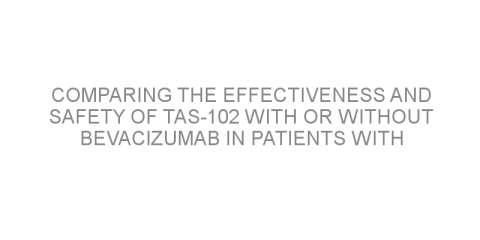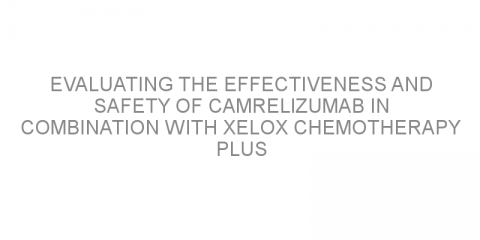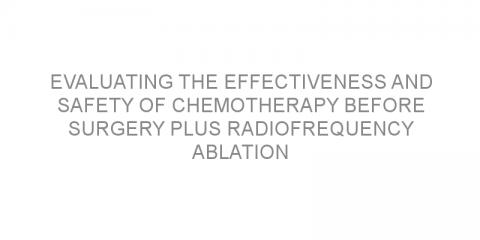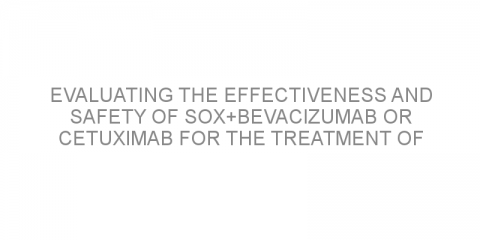Two of our most popular previous blog posts described free vacation opportunities for adults with cancer. Given the uncertainty of the past two years, we thought it was time for an update. Here is a short list of organizations that have made it their mission to provide needed respite to those affected by cancer. Each has been verified to have...
Read MoreColorectal cancer Posts on Medivizor
Comparing the effectiveness and safety of TAS-102 with or without bevacizumab in patients with metastatic colorectal cancer.
In a nutshell This study evaluated the effectiveness and safety of bevacizumab (Avastin) plus TAS-102 (Lonsurf; trifluridine-tipiracil) versus TAS-102 alone for the treatment of patients with metastatic colorectal cancer (mCRC). The data showed that bevacizumab combined with TAS-102 was effective with manageable side effects in improving the outcomes...
Read MoreEvaluating the effectiveness and safety of camrelizumab in combination with XELOX chemotherapy plus bevacizumab or regorafenib in patients with advanced colorectal cancer.
In a nutshell This study investigated the effectiveness and safety of camrelizumab (SHR1210) in combination with XELOX (capecitabine and oxaliplatin) chemotherapy plus bevacizumab (Avastin) or regorafenib (Stivarga) as first-line therapy in patients with metastatic colorectal cancer (mCRC). The data showed that the combination was effective for these...
Read MoreEvaluating the effectiveness and safety of maintenance strategies after first-line treatment with anti-EGFR plus doublet chemotherapy regimen in real-world patients with left-sided RAS/BRAF wild-type metastatic colorectal cancer.
In a nutshell This study evaluated the effectiveness and safety of maintenance strategies after first-line treatment with anti-EGFR (epidermal growth factor receptor) plus doublet chemotherapy regimen in real-world patients with left-sided RAS/BRAF wild-type metastatic colorectal cancer (mCRC). The data showed that maintenance therapy with 5-fluorouracil...
Read MoreEvaluating the effectiveness and safety of chemotherapy before surgery plus radiofrequency ablation for patients with colorectal cancer liver metastases.
In a nutshell This study evaluated the effectiveness and safety of chemotherapy given before surgery (neoadjuvant chemotherapy; NAC) followed by radiofrequency ablation (RFA) for the treatment of patients with colorectal cancer liver metastasis. The data showed that NAC plus RFA improved survival outcomes in these patients. Some background Colorectal...
Read MoreInvestigating the side effect profiles of different PD-L1/PD-1 inhibitor-based combination therapies.
In a nutshell This study investigated the side effect profiles of different PD-1/PD-L1 inhibitor-based combination therapies. The data showed that PD-1/PD-L1 inhibitors in combination with chemotherapy were associated with a higher risk of treatment-related side effects than with targeted therapy or immunotherapy combinations. Some background...
Read MoreEvaluating the effectiveness and safety of capecitabine maintenance versus active monitoring for the treatment of patients with metastatic colorectal cancer.
In a nutshell This study investigated the effectiveness and safety of capecitabine (Xeloda) as maintenance therapy versus active monitoring for the treatment of patients with stable metastatic colorectal cancer (mCRC). The data showed that capecitabine maintenance improved survival without cancer worsening with manageable side effects for these...
Read MoreEvaluating the effectiveness and safety of maintenance therapy with panitumumab plus fluorouracil and folinic acid in patients with RAS wild-type metastatic colorectal cancer.
In a nutshell This study investigated the effectiveness and safety of panitumumab (Vectibix) when added to maintenance therapy with fluorouracil (Adrucil) and folinic acid (Leucovirin) (FU/FA) in patients with RAS wild-type metastatic colorectal cancer (mCRC). The data showed that maintenance therapy with FU/FA plus panitumumab was safe and...
Read MoreIs cancer treatment with immune checkpoint inhibitors associated with infection risk?
In a nutshell This study is aimed to evaluate the risk of infection for patients who are treated with immune checkpoint inhibitors (ICI) for solid tumors. The study concluded that in frail patients, ICI therapy alone is safer compared to chemotherapy (CT). Some background Immunotherapy is a type of cancer treatment that makes use of the immune...
Read MoreEvaluating short-course radiation therapy followed by chemotherapy for patients with rectal cancer.
In a nutshell This study evaluated short-course radiation therapy (RT) followed by chemotherapy as a non-surgical treatment of patients with rectal cancer (RC). The data showed that treatment with short-course RT and chemotherapy is safe and effective for these patients. Some background Colorectal cancer (CRC) is one of the most common types of...
Read MoreEvaluating the effectiveness and safety of SOX+bevacizumab or cetuximab for the treatment of patients with advanced colorectal cancer with wild-type KRAS.
In a nutshell This study compared the effectiveness and safety of S-1 (tegafur/gimeracil/oteracil) and oxaliplatin (Eloxatin) combined with bevacizumab (Avastin) or with cetuximab (Erbitux) in patients with previously untreated advanced colorectal cancer with wild-type KRAS. This study concluded that the safety and effectiveness of...
Read MoreAn update on minimally invasive surgical approaches for rectal cancer.
In a nutshell This study reviewed the current minimally invasive surgical (MIS) approaches for the treatment of patients with rectal cancer (RC). Some background Rectal cancer (RC) is one of the most common types of cancer worldwide. RC involves the final part of the large intestine or rectum. RC can be treated by surgical removal of the tumor. Some...
Read More














